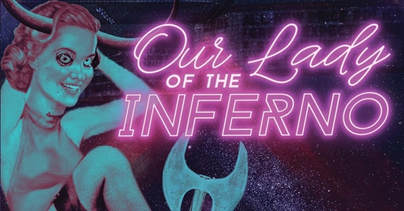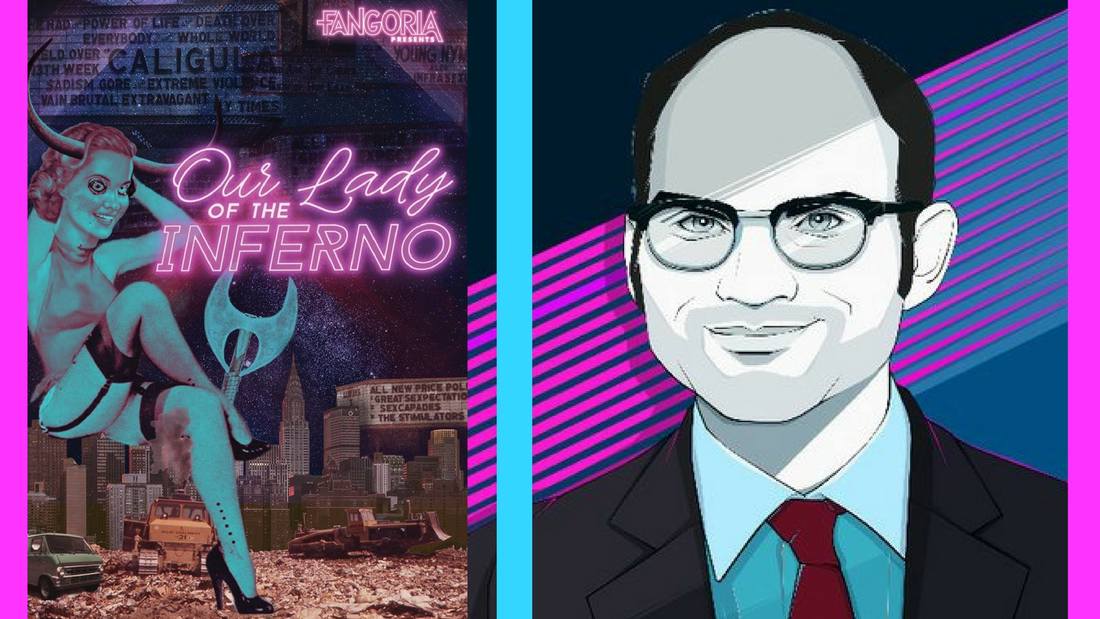 By now, many of you have probably heard that the beloved Fangoria magazine is returning, thanks to the Texas based company, Cinestate, flying in like some caped crusader to save the day. But what you may not know, is that in September, Fangoria will be launching their own line of Fangoria presents books, beginning with a seedy horror novel that is sure to inspire chills and thrills amongst fans, Our Lady of the Inferno… …Written by Preston Fassel (a staff writer at Fangoria), Our Lady of the Inferno is a disturbing allegory of two women on a fateful collision course wrought with blood-shed and sheer terror. Taking place in the seedy streets of 1983, New York, we find Ginny, the “bottom girl” for a pimp and his prostitution ring. Not at all what you’d expect, she’s a tough, intelligent leader with a poetic soul who treats the girls that work under her like sisters. She makes it her duty to protect them, no matter what the cost. It’s that very leadership that attracts the attention of Nicolette, a ruthless killer who believes herself to be merely a vessel for a much darker, powerful force. Ginny becomes the ultimate prize for Nicolette, the buck that she must mount on her wall, so to speak. Ginny just doesn’t know it yet. Let me just start by saying that Fassel completely caught me off guard with just how good his writing is. I don’t know about you, but when I sit down to read a first novel from an author, expectations are generally tempered. Well, Fassel took those expectations, loaded them in a dump truck, dumped them in a grinder, fed the remains to an alligator ala some insane Bond villain, then beat the shit out of that gator and ate it like a boss. Fassel hooks you with smooth, disarming prose that flows so naturally that it often comes as a shock when you suddenly find yourself on the verge of tears or trembling with disgust. Our Lady of the Inferno lures the reader into a neon-lit world that is so disgusting, so unnatural to the every-day routine of what one could consider a “normal” life, that its astounding to me how real and, strangely enough, natural that Fassel makes this world of scum, sex, and scummy sex seem. A large part of that has to do with his characters, in particular the star of the story, Ginny. A real badass with a dash of tragedy, Ginny is a fascinating heroine who is unlike any character I have ever read. She may be the bottom girl for a dirt bag pimp on the sleaziest street in New York, but she’s nothing like what stereotypes may lead you to believe. There’s actual depth to Ginny, which goes far beyond the normal route taken with these types of characters. Sure, she has the usual clichéd backstory involving a tragic past that has led her to a life of selling her body, but Ginny isn’t just some sob story who we’re supposed to feel bad for. She’s also supremely intelligent and motherly, with a creative soul that yearns for a little magic in her life. One of our first moments with Ginny is reading as she gathers her girls into a room, where they do things like study foreign language, have book club meetings, and occasionally even conduct science experiments, all in order to guarantee that these girls don’t lose themselves and become the mindless trash that everyone expects them to be. The fact that Ginny has a handicapped sister named Tricia only strengthens our understanding of Ginny, as we begin to see that all of this, the sex, the sacrifice, is for her. But Ginny isn’t all hero. Early on, she attempts to recruit a girl named Tammy, using misleading tactics which she knows on the inside are deceitful and immoral, yet no matter how guilty she feels, she does it anyway. Some readers may understandably distance them from Ginny because of this, but I found it only makes her more human, and it’s these sort of moments that let Fassel’s characters seem more real than the book you’re holding in your hands. These are STRONG, complicated women which come off the page so vividly you may think you can reach out and touch them…for a price, of course, one which may include (deservedly) losing a finger or five. Nicolette, the foil to Ginny, is equally as strong and about a thousand times more unnerving. Part Patrick Bateman, part the Night Slasher from the movie Cobra, Nicolette is a terrifying force of nature that chills beyond just the bones, but deep into the marrow of our rattling skeletons. The Bateman reference is easy to assume, but why I mention the Night Slasher is because those who remember that performance from Brian Thompson will recall that he spends the entire film with his eyes so wide and full of lunacy they’re practically bulging out of his head like a Chihuahua. I got the same impression from Nicolette, a killer so mad she sees herself as not a human, but a rampaging minotaur deserving of “tributes” from the city. Even more frightening about Nicolette than the referenced characters is the way in which Fassel takes us deep inside the dark corridors of her mind. He brilliantly fabricates a whole new language for Nicolette, a woman who refuses to acknowledge anyone by their name, instead thinking of them as “Someone”, a title which she disallows Ginny and her girls, instead referring to them as the “pornai”. Forget the scalding showers, you’ll want a skin graph after being inside of Nicolette’s head, because that’s the only way to be sure you’ve rid yourself of the grime and layers of dry, coagulated blood. She’s a villain whose eyes bore through the ritualistic garb she wears when slaying victims, eyes that are going to haunt my nightmares for a long time. Fassel does have a tendency to write dialogue like a first time author, which isn’t necessarily a complaint, but more of an observation. He cares about detail to the point where each character has such a specific way of speaking, that while it allows the reader to develop a certain cadence in their minds for these people, it can often come off a little obnoxious and slow down the pace a little as the reader tries to slog through some particularly difficult verbal attributes, such as the nervous stuttering of Ginny’s friend, Roger. Fassel packs Our Lady of the Inferno full of cringe-worthy tension, with enough gallons of blood to satisfy even the most depraved of horror fans. Villains are more prevalent than the cat calls on 42nd street, attacking Ginny from all angles between The Colonel (her pimp), Nicolette, and even Ginny herself as the world collapses around her, slowly chipping away at her psyche. At times, it feels as if there is no relief, no escape from the pressure of the walls closing in. Which, when I think about it, makes the metaphor of the “maze” in which Nicolette hunts her victims all the more fitting. This is a story about two women trapped inside their own mazes, each of which they have created for themselves, leaving the question, which one of them will get out? While I’m obviously not going to spoil that for anyone here, I will say Fassel writes such invigorating prose, that even after a long, exhausting night shift working from 9pm-7am, I still needed to come home and devour the last twenty or so pages of Our Lady of the Inferno. From page one to the final, fleeting sentence, Our Lady of the Inferno is a captivating trek through the unwashed fat of our nation’s underbelly. If you don’t laugh, cry, or have to stop yourself from shuddering as you close the book, I’ll have to wonder if you even know anyone’s name, or if we’re all just “Someone” to you. Reading Our Lady of the Inferno is like taking a journey through that maze yourself, never knowing what’s around each corner, with the knowledge that the only way out is by confronting your greatest fears in a trial of horror and violence. Preston Fassel and Fangoria have outdone themselves with this first entry into what will hopefully be a long series of success with the Fangoria Presents line. Our Lady of the Inferno releases September 11th, 2018. By Matt Konopka
0 Comments
Leave a Reply. |
Archives
March 2023
|


 RSS Feed
RSS Feed